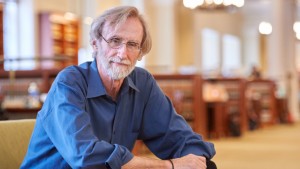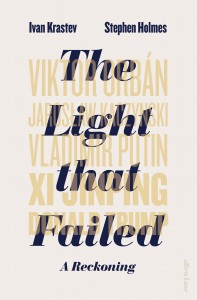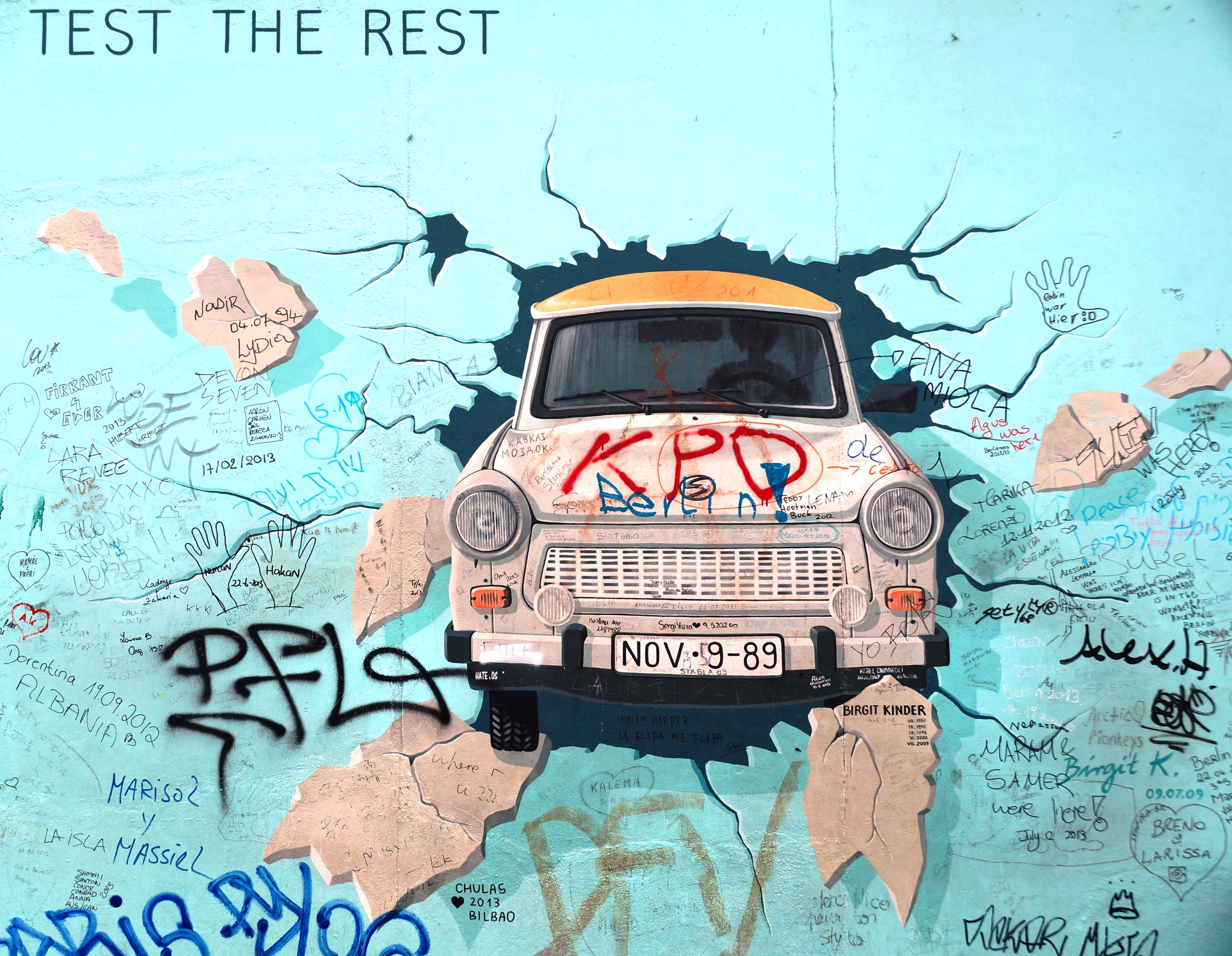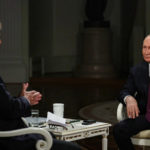Stephen Holmes, is a Professor of Law at the NYU School of Law, New York and co-author, together with Ivan Krastev, of The Light That Failed. A Reckoning published in October by Allen Lane (an imprint of Penguin Books). In a work of startlingly original political psychology, two pre-eminent intellectuals propose that the post-1989 world order has been characterised by 30 years of what they call The Age of Imitation – a period of Western democratisation in which Eastern European values would be bent to the liberal fiscal, cultural and moral politics of “integration”.
Going back to 1989, to the hopes embraced during the postCold War transformation, has the West created/enabled a Frankenstein? I was struck that your book was built around the image of Frankenstein. So what did the West get wrong? Has the light of liberal-democracy really failed?
Stephen Holmes: We try to make a general point about the paradox in a region in which, in 1989, democracy and liberalism were celebrated. Today the trends in two countries are anti-liberal and undemocratic. So how did that happen? The Frankenstein image is an analogy, and is meant to highlight the way replica regimes often create unexpected resentment. This is something that happened not only in the post-1989 period. There are many examples in history.
For example, Germany after WWI, which was trying to build a parliamentary democracy, created a lot of resentment. This is something the Westerners missed – not understanding the way Central and Eastern Europeans experienced the process of democratisation.
This happens because in the West after 1989 there was a naïve belief that democracy was the natural state of affairs – after you get rid of a tyrannical regime, democracy will pop out like a toast out of a toaster. So if you get rid of tyranny you get democracy. We saw the pathological expression of this in Iraq, that you would see democracy after a six-week military campaign.
To what extent did the cultural and political legacies of the previous regime amplify the problems of the post-communist transition?
SH:One important factor that is relevant to this question is that the groups that most succeeded financially and politically in the new system – which was supposed to be based on meritocracy and freedoms – were those who were able to translate the assets of party affiliation in the old regime into economic assets in the new regime.
There was resentment at the fact that the change, however radical and traumatic, still advantaged those who were basically oppressing the society in the old regime. In this sense the resentment is not simply against liberalism and democracy, but against a system where old regime elites were able to translate their position into enormous wealth. Also this is quite important as part of the antiliberal mentality.

Photo: New York University
Liberalism focuses as a central value on human rights, individual rights, but the greatest sin of the transition from Communism to post-Communism was the privatisation of public assets. The individual rights framework was not adequate at capturing the grievances that existed. In fact those who expropriated used the property rights to legitimate their new privileges. There was a sense that liberalism as a way of thinking was not adequate in understanding the trauma of the transition.
From Havel and Michnik to strong identitarians like Orbán and Kaczyński. In your book you point out that “the rise of authoritarian chauvinism and xenophobia in Central and Eastern Europe has its origins in political psychology, not political theory.” What are the psychological roots of the resurrection of ethno-politics in the CEE space?
SH: It is very common, as an analysis of populism, to describe what we see today as a return to an earlier form of communitarianism in the region, something that was widely spread in the 1930s. During the 1990s, nationalism had a very bad reputation – you couldn’t talk about national aspirations because they were identified with this kind of fascist, Milosević, violent, racist type of regime, even if there were important nationalistic motivations for the return of the CEE to the West. Poland is the most obvious example.
It may be true that the Poles were in love with liberal democracy, but it is also true that they were trying to get away from Russia. Trying to escape from Russia is a nationalist story, not a liberal democratic one. They couldn’t be so open about this, they were using the language of liberal democracy in part because they were looking forward to accession to the post-national EU in which the dominant ideology is what we call in the book the New German ideology (the ideology of post-nationalism with no real flag, no real history, no real national heroes).
That was understandable in the history of Germany, but it was not easy to export that to a country like Poland. Nonetheless, that was the language at the time. There were obviously nationalistic feelings, but the argument that Ivan Krastev and I make is that although a return to the past is an important contributing factor, on the other side it is too shallow an explanation. It is what we call in social sciences mistaking analogy for causality: we explain the way we are today because it reminds us of the way we used to be.
For us it makes more sense, it contributes more to understanding what happened to think of the populist turn as the emergence of the counter-elite (mostly with provincial origins) that capitalised on the fact that the liberal elites of the country were neglecting the symbols of national identity in order to pursue the dream of accession to the European Union and its post-national idea.
Liberalism is in crisis and struggling because it has to deal with issues which it wasn’t really built to deal with. Like globalisation.
That lack of attention to these national symbols opened the door for a counter-elite and political entrepreneurs, many of them cynical, to appeal to these feelings of being neglected, which were exacerbated not only by the slowness of the transition, but also by the fact that the very process of democratisation and liberalisation – seen from the point of view of the East – was a process of imitation. In itself, imitation may sound harmless, but imitation always implies a relation of superiority and inferiority.
As for the way it was conducted, it was not simply a matter of borrowing a few elements and grafting them onto national traditions, but there was the message that all your national traditions are worth very little, that you need to convert to our way of life which is superior to yours, that we as the model nations have a right to monitor you, judge you, evaluate you. The imitation relation was a process that in itself produced trauma.

There is another trauma in the messaging of the West, which was, “You are going to be evaluated according to your success or failure to be like us. This trauma was exacerbated by the fact that we are going to write your laws while you have to democratise (pretending that you are ruling yourselves).” The whole process had an edge of humiliation. The elites themselves were weakened by the schizophrenia of transition.
Norms are rules that help you coordinate within your society. There is a lot of pressure to stay within the normative framework prevalent in a society in which there is a good deal of corruption. The Westernisation process, on the other hand, told the elites who were living in these societies that any form of corruption is absolutely impossible, so you create an elite that is trying to navigate both worlds, to fight corruption but has to participate in it, so it is trusted in neither of the two worlds. This is a very good example of the political psychology of post-Communism.
These are contributing factors, they are not reverting to the past, which says that what we are feeling is a much more primitive ideology, that these countries are just going back to the way they have always been – authoritarian, nativist – as there was no shock, and there was nothing that the West did inadvertently. We are trying to focus on the things that happened during the transition and how they contributed to what we see today, and our argument is aimed explicitly against the idea that this is just a natural return to the status quo ante, the way these countries always were and were destined to be.
The 1990s were heralded as the age of the end of history, the age of liberal democracy. 30 years later it’s the opposite, the age of illiberalism; the “liberal” dimension is attacked in the name of democracy. How should illiberalism be understood? What does illiberalism target in liberalism?
SH: Liberalism conceives society as a network of producers and consumers. It does not understand the folk spirit or the national community. It is focused too much on liberty and not enough on community. Today, illiberalism is understood in the populist movements as being against open borders, gay marriage, women’s equality. But I don’t believe there is an illiberal vision of society.
Every country has many pasts. The illiberal politician will take one path, will elevate it into the true past, and will try to say that this is the authentic “we”. It is mainly rhetorical. They don’t really want to return to that. Do they want to say they are in favour of arbitrary arrest and imprisonment? Will they say this openly? Will they say that they are in favour of the government controlling all information on which the government’s competence is judged? They do that, but do they say it openly?
Will they say that our values are such that we want all the information on which the public judges us to be controlled by the government? It speaks to the question – are these guys illiberal democrats? They are democrats in no sense. They do not want alternation to power. Alternation to power is democracy. It means they know how to manipulate public opinion, public fears and public anxiety.
In a way the weakness of these illiberal movements is that unlike communism, they don’t have a picture of what they want to have. It is very hollow, and therefore very fragile. But they certainly point out the weaknesses in liberalism. Liberalism is in crisis and struggling because it has to deal with issues which it wasn’t really built to deal with. Like globalisation. Globalisation creates splits within society between the groups that are globally connected and the ones that are not.
The globalised elites have a good reason to look westward, but often that means turning their back on their own fellow citizens. This is what led to the opening for the populist counter-elite to emerge. The biggest risk today is misinterpreting the end of liberal hegemony as a sign of the end of liberalism. The expectation of 1989 that all countries must conform to the liberal model is over.
But the power of liberalism – the power of individualism, the power of freedom of thought, the principle that the citizens have the right to examine their government as a cure for corruption – all these are very much alive. After chasing their ambition of being the only model for all societies, liberals have to understand that is not going to happen. Liberalism is not the only way to create a society and it is not the only way to mobilise power.
But the idea that liberalism is obsolete – Putin made this joke the other day – is not true. What is true is that the liberal project of 1989 in which everyone must submit to the liberal model is over. What we have to do is to understand the role of liberalism in this much more pluralist world.
The contemporary illiberals seem to have a very strained relationship with the “checks and balances” architecture inherent in a liberal democracy. As Viktor Orbán said during his latest White House visit – “from the people, by the people, for the people. This is the basis for the Hungarian government”. It seems that they are selectively focused on the democracy side, forgetting the other pillar of what modern democracy is really about.
SH: Kaczyński uses the phrase “legal impossibilism”. They argue that checks on the power of the elected government are basically a foreign plot to prevent us from expressing the will of the authentic Hungarian or Polish nation. This brings me back to how you define democracy.
Democracy is a system of accountable government. Accountability means that when a government makes a decision, it is required to justify that decision before a body that has the power to say no, push back, criticise and to suggest alternatives. A government that has no responsibility for giving justifications for its actions soon is doing things that have no justifications, has no safety checks on it and no reality checks. Democracy is about a culture of justification, and a culture of security checks on government.
This was not a Western plot. It is rooted in the enlightenment project, the scientific revolution, and the idea that a scientific hypothesis has to be questioned by others so that the only justification you have for your belief is an invitation to others to refute it.
The biggest risk today is misinterpreting the end of liberal hegemony as a sign of the end of liberalism. The expectation of 1989 that all countries must conform to the liberal model is over. But the power of liberalism remains very much alive.
This is John Milton, Thomas Jefferson, it is an idea of what rationality is. Rationality is not a trait in an individual, it is a trait of a system in which every proposal is subject to criticism; and those who take a political decision and support a policy must base their decision on facts and arguments which are susceptible to refutation by counterevidence and counter-arguments. This is the essence of the democratic project.
The premise of democracy is that everyone makes mistakes, including powerful leaders. Everybody hates to admit mistakes, especially powerful leaders, and everybody likes to show the mistakes of their political rivals. Democracy operationalises these premises in a system of checks and balances. What Orbán and Kaczyński are trying to do is reduce the checks and balances to paralysing government, stopping it, preventing it, making it impossible to act, when in fact the purpose of these rules is to increase the rationality of government, to inject some degree of reason into the decision-making process of the government.
It is not about restricting the government, it is about making sure the government does not go off the rails and make mistakes that can’t be corrected in time. Every decision has complex consequences, including costs and opportunities that need to be evaluated and contemplated before one acts. Democracy is meant to do that.
There is an imperative need to rethink nationalism, patriotism, what national identity is. In the early 1990s, Ralf Dahrendorf warned about the democratic disappointments, about the fact that constitutional patriotism and the open society are not enough to replace tribal (blood and soil) identities. How should nationalism be rethought? The nativist, nationalist reactions in some CEE countries seem to be bringing back a fundamental difference between how nationalism is understood in Old Europe (civic and inclusive) and how nationalism is understood in some parts of the New Europe (exclusivist, ethnic and tribal).
SH:To some degree a national feeling is required for a democracy to work. You cannot completely obliterate this. But the national identity can have different forms: some can be more ethnic, others less ethnic. In the US there was a large ethnic component to democracy as it first developed. A Chinese person could not become a citizen of the US until 1943. So to what extent is nationalism, patriotism compatible with some feeling of national solidarity, without believing that a common bloodline and co-sanguinity is the basis of the coherence of the state?
Trump is not just a continuation. He is basically a nihilist, a Nietzschean figure, he thinks there is no such thing as values, truth; impartiality does not exist.
I think it is completely possible to have a kind of soft identitarianism, like the Big Fat Greek Wedding – where identity is about food, clothing, relatives, but it is not conceived as an overwhelming identity, it does not encourage those sharp divisions between those who belong to your ethnic group and those who belong to another. Strong ethnicity, strong identitarianism, can take the form that if your child marries someone from a different ethnic group, you hold their funeral.
This is inconsistent with liberalism. It is an illiberal thing. Whatever form of communitarianism is compatible with the nation state has to be separated from myths of co-sanguinity. There is a fear of assimilation by outside groups with different bloodlines. This myth that culture represents co-sanguinity, and therefore blood connections with remote ancestors, is the essence of illiberalism. This is key to a form of national identity which can be culturally specific, but it is liberal because it is not committed to the myth that a shared culture is a sign of co-sanguinity.
What is the place of Trumpism within the broader context of the anti-liberal revolt?
SH: Trump is radical, he is not just a continuation. A sign of his radicalness is his rejection of American exceptionalism, his claim that America is not morally superior to other countries. That is quite amazing because this is what America’s enemies are saying. He says this in front of crowds that are cheering, “USA, we are not better than anyone else, we kill, we interfere in elections”.
He gets people to cheer for this. He is not a religious person, he has no family values, but he has rejected the very powerful idea that America deserves global power because it is such a morally good country and that all the others want to imitate it. Interestingly, Trump and Orbán share this idea that if the West looks very attractive you want to go to it. Orbán is saying, “let’s describe the West as unattractive because it is an ethnic nightmare, so people might not want to go”.
Trump says that if we make America very unattractive, people won’t come. That is why we are using the category of imitation in his case also, because instead of saying the imitator feels inferior to the imitated, he says that the imitated are the losers: America is the greatest loser from the Americanisation of the world because all these immigrants want to come here, they are stealing our technology.
In short, the imitators are threats. For Trump, Germany and Japan are the most scandalous examples. “They became industrial powerhouses because they copied us.” Trump does not see the transformation of America’s former militaristic enemies into peaceful capitalist democracies as a victory for American foreign policy.
He has also no interest in alliances. He wants to destroy the Western alliances. He doesn’t like countries that compete with us economically. Russia and Kim Jong-un don’t compete with the US economically. Trump is essentially a nihilist.
He says that “I lie in my own interest, you tell the truth because it is in your own interest, if it was in your interest to lie you would lie, if it is in my interest to tell the truth, I will tell the truth. But truth has no value in itself. Justice is nothing except factions. I don’t obstruct justice, I am only fighting back.” He is basically a Nietzschean figure, he thinks there is no such thing as values, truth, justice; impartiality does not exist. That is something that we have never seen before. The people around him are not nihilists, but cynics. They think they can use him for advancing their own agendas. The question for America is, Can cynics use a nihilist without being infected by nihilism? The answer remains open.


